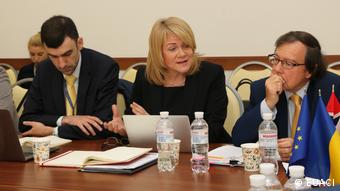Head of the newly-created National Agency of Ukraine for Finding, Tracing and Management of Assets Obtained Through Corruption and Other Crimes (ARMA) Anton Yanchuk was appointed back in December 2016, the remaining personnel hired during the following months. But the Agency only started active work – search of assets with the aim of their seizure in criminal proceedings and further management of the seized property – in October 2017.
From the very beginning, the launch and functioning of the Agency caused great interest of the European Union. Creation of the ARMA was part of the action plan on liberalization of Ukraine’s visa regime with the EU. A significant part of the effort made by the EU Anti-Corruption Initiative (EUACI) aims at helping the Agency.
A year after the ARMA started working, Western asset recovery and management experts invited by EUACI visited Ukraine to audit the effort of the still new agency. DW was able to talk to them and ask them what they thought of the first professional steps of the Ukrainian colleagues.
Why It Is Important
Explaining EU’s scrutiny of a separate agency that would work on finding and management of questionable property, MONEYVAL member John Ringguth says this subject has become of great importance for European law enforcement in the recent decades.
Those years demonstrated that the fight against organized crime is often ineffective, since after leaving the prison, criminals got access to illegally obtained property anyway. “That is why many countries have changed and continue to change their legislation to seize such property – from financial assets and securities to real estate and cars,” says the expert. In this situation, European countries started rapidly creating agencies that would search for such assets and preserve their value if they were seized.
Like in Europe
Even though the Ukrainian ARMA has only been working for a year, Western experts assess the first steps of the new agency quite positively. First of all, CARIN founder Jill Thomas points out that the Ukrainian colleagues have all the necessary powers and tools to find assets in order to freeze or seize them subsequently, both in Ukraine and abroad. “When the ARMA was created, the different models of such agencies that exist in Europe were taken into account. I cannot say that the Ukrainian agency is the exact copy of any one of them, but its functions are fully consistent with those of any European office for asset recovery,” says Thomas.
She also says that the Ukrainian agency’s management has established good partnerships with its Western colleagues. It can help not only to obtain information on suspicious assets abroad but also to help with international investigations involving property or other valuable objects on the Ukrainian territory.
Premature Conclusions
Ringguth praises the successful human resources policy of the head of the ARMA. In the conversation with DW, he said that everyone he talked to in the Agency were “young, motivated and competent.” “Many similar agencies made major mistakes starting from scratch, which harmed their reputation for a long time. ARMA has managed to avoid such missteps so far,” says the expert.
Pedro Gomes Pereira, a Brazilian lawyer, holds a post-graduate degree in Constitutional Law and has over 10 years’ experience in the field of asset recovery and in preventing and combating corruption, organised crime and money laundering, recommends to wait with the conclusions, though. He believes it is too early to judge the Agency’s work, since some cases where asset recovery and management are involved can take decades. “Yes, the ARMA currently looks like a European institution, but there has been too little time to judge,” explains Pereira.
Boring Victories
It is already clear, says Ringguth, that the Ukrainian agency needs to make ore effort to succeed. He believes communication with the public and the colleagues in the law enforcement system is crucial for the ARMA. While the public needs information on the actual benefits of the ARMA’s work for the society, the colleagues need to be made aware of the tools that the Agency may provide. “Many people consider the news that the ARMA received a certain asset for management boring, while the courts do not use special seizure stipulated by the Ukrainian legislation, thus losing the chance to preserve illegally obtained assets for the national budget,” says the expert.
Without judicial help, the ARMA has its hands pretty much tied, explains Pereira. “The Agency works in a reactive mode, it needs to be approached by law enforcers or judges to track certain assets or start their management,” says the expert. Thus, without establishment of proper cooperation with colleagues, the ARMA will have rather limited opportunities.







